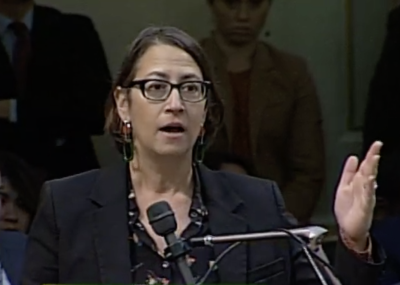As the California Legislature enters the last stretch of the session, agricultural groups are marking victories with bills that have stalled or taken significant amendments to remove opposition.
One of the most defining moments of the year came recently when a broad coalition of farm groups and pesticide manufacturers dropped their opposition to Assembly Bill 2113, a measure to dramatically raise the mill assessment on pesticide sales and shore up the budget for the Department of Pesticide Regulation. Gov. Gavin Newsom signed the measure just before the Legislature broke for recess.
Lawmakers had rejected the administration’s proposal for expanding the mill and rallied behind AB 2113, which offered the same increase but with critical legislative oversight. After hearing concerns over accountability and transparency from industry as well as environmental justice advocates, Assemblymember Eduardo Garcia, D-Coachella, used the bill to put a set of guardrails on DPR.
Cut through the clutter! We deliver the news you need to stay informed about farm, food and rural issues. Sign up for a FREE month of Agri-Pulse. Simply click here.
The administration’s trailer bill would have enabled DPR to enact additional increases in four years. AB 2113, however, put a cap on such increases, unless the department obtains legislative approval. The bill also requires DPR to meet certain timelines for registering new products and to report annually on that progress. Farm groups worked closely with Garcia as well as the administration and legislative leaders on the bill, which led to bipartisan support in committee and floor votes.
 Asm. Laura Friedman, D-Glendale
Asm. Laura Friedman, D-GlendaleAnother pesticide bill took somewhat hostile amendments from the Senate Agriculture Committee ahead of a key deadline to move bills out of committee. Asm. Laura Friedman, D-Glendale, pushed for protecting farmworkers and neighboring communities by immediately banning use of the herbicide paraquat until DPR has completed a reevaluation and cancels or suspends the registration.
Leading an opposition coalition, Taylor Roschen, a lobbyist for the firm Kahn, Soares & Conway, noted that paraquat has been widely used for decades and is well researched, with more than 1,200 safety studies reviewed by regulatory authorities around the world.
“AB 1963 is, from our perspective, an unscientific ban that puts the Legislature in the driver's seat in making decisions about product safety,” said Roschen.
In the harried days before the final committee hearing on AB 1963, Freidman and her staff pressed the Senate Agriculture Committee to add only minor amendments to the bill. She hoped to bump the ban back to 2028 and enact it only if DPR does not complete an evaluation by that time. She dropped the registration requirements as well.
“We needed a moratorium in place because we needed to have a real reason for them to continue to complete the evaluation,” said Friedman. “Otherwise, it's more of a suggestion if there's no sort of penalty for them. They could just continue indefinitely.”
Yet that message was lost in a frenzy of weekend emails with committee staff and Friedman’s office. By the following Monday morning, Agriculture Chair Melissa Hurtado, D-Bakersfield, entered the hearing assuming Friedman had agreed with the committee’s amendments to drop the prohibition.
Like Hurtado, Roschen was surprised at Friedman’s attempt to amend the bill in the middle of the hearing, which would run afoul of Senate rules.
“To have this committee overturn months of debate and learning on how to invest, expedite, improve and daylight the process at DPR is very concerning,” said Roschen.
Hurtado had thought the amendments in print that day were those sent over by Friedman’s team.
“I find it surprising there is a change of heart,” said Hurtado.
Friedman turned it on Hurtado’s staff, arguing a verbal agreement on Friday was not incorporated into the language on Sunday. She said that removing the moratorium would not give the bill “any real teeth” and would turn it into a simple nonbinding resolution.
Senator Steve Padilla, D-San Diego, sympathized with Friedman’s sense of urgency, saying he did not “want to see this can kicked down the road any further,” but countered that DPR is already authorized to suspend registrations after it performs an evaluation. Sen. Dave Cortese, D-Silicon Valley, on the other hand, did not want to see the committee “claw back” the moratorium and urged a special exemption to amend the bill on the spot. That drew a swift retort from Sen. Marie Alvarado-Gil, D-Jackson, who rushed over from another committee hearing to interject.
“We do not negotiate in these committee meetings,” said Alvarado-Gil, who asserted she was not prepared to vote on any language other than the committee’s recommendation. “I would advise that you continue to work on this bill by resubmitting it next year.”
The disagreement drove Hurtado to call a recess twice, drawing scorn from Alvarado-Gil that “whatever side conversations were happening in recess were not privy to public participation.”
The lawmakers eventually approved the bill with the committee amendment to remove the moratorium. But they tagged on a note for the next committee, Senate Appropriations, to consider readopting the moratorium or a similar enforcement mechanism back into the measure.
Despite the uncertainty over the future of the bill, the approved amendments spurred groups like the Agricultural Council of California to drop their opposition to SB 1963. Appropriations will take up the measure next month.
For more news, go to Agri-Pulse.com.


